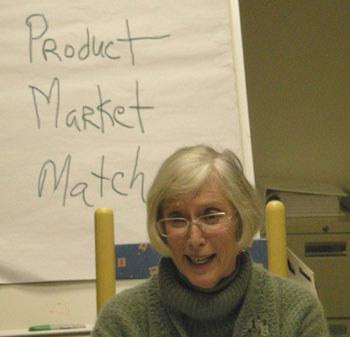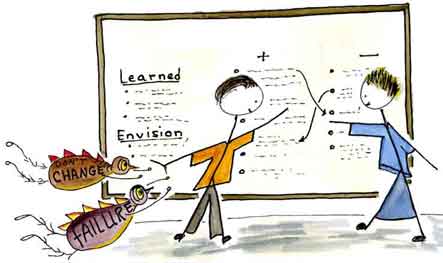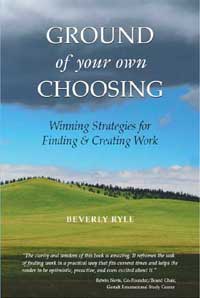Tag
The Right Resource

I finally did it—started strength training. In 2009 my doctor said that my worsening T-scores (bone density results marking the progression of osteoporosis) indicated that I either had to take action or go on medication, but I only got as far as checking out, and rejecting, membership in a local gym—if I didn’t enjoy being there for the five minutes it took for the receptionist to show me around, it was highly unlikely I would have gone three times a week.
For five years I discarded one idea after another—a treadmill in the basement, exercise videos, a personal trainer who thought that anyone over 40 had entered old age. I did take longer walks and tried to follow the exercise program, albeit haphazardly, in a book on how to build strong bones, but I knew I wasn’t challenging myself enough and felt like I was copping out.
What was missing was the right resource.
What’s Open?
 On outer Cape Cod where I live there is the summer tourist season, when every business has more than they can handle, the fall “tour-bus” season, which some businesses stay open to accommodate, and the off-season when any discussion of where to go starts with, “What’s open?”
On outer Cape Cod where I live there is the summer tourist season, when every business has more than they can handle, the fall “tour-bus” season, which some businesses stay open to accommodate, and the off-season when any discussion of where to go starts with, “What’s open?”
I’ve grown used to the limitations that go with living year round in a summer vacation destination, but I didn’t expect to find the same problem on a recent visit to Washington DC which happened to coincide with the first day of the government shutdown.
All the places I’d hoped to visit—the National Gallery, the World War II Memorial, the Holocaust Museum, the National Arboretum—were closed, so I said to myself, I need to do what I do all winter—direct my attention to what’s open.
Being Responsible
 I like words, discovering new ones and looking up their meanings, yet I’ve always had an aversion to any piece of writing that starts off with something like, “The word x is defined as....” It’s always felt like a weak beginning and I’ve vowed never to do it.
I like words, discovering new ones and looking up their meanings, yet I’ve always had an aversion to any piece of writing that starts off with something like, “The word x is defined as....” It’s always felt like a weak beginning and I’ve vowed never to do it.
But sooner or later we end up breaking our hard and fast rules, so I’m going to start this column with a definition for the word "responsible" which you won’t find in any dictionary: being responsible means changing the toilet paper roll when the old one is empty.
It’s a simple practice but it’s not as easy as you might think, especially for someone as mechanically challenged as I am. I’ve often had to collect the two sections and center spring of the spindle from the floor multiple times before finally getting it back on the holder, or have spent an extra ten minutes in a public stall trying to figure out how to reload one of those multi-roll contraptions.
What's important about this exercise is that I took the time to attend to the task in front of me, without an audience, or accountability, or the expectation of any reward beyond the boost it gave to my own self-esteem.
Should vs. Want
 Raise your hand if you’ve ever spent a lot of money on a textbook for a class you really didn’t want to take.
Raise your hand if you’ve ever spent a lot of money on a textbook for a class you really didn’t want to take.
I have a vivid memory of waiting in line in a college bookstore to buy an 800-page statistics manual for a quantitative methods course in an MBA program. I was recently divorced, in my mid-forties, re-entering the work world, and this was the prescribed credential.
But as I inched closer to the checkout area, I happened to pass the Art History section and my heart beat faster as book cover images of Gothic cathedrals, Old Masters and Impressionist landscapes caught my eye. A powerful urge to abandon multivariate data analysis for Degas’ ballerinas came over me, but I dutifully held on to the textbook, even as it grew heavier in my arms.
Feedback Treatment
 A couple of weeks ago I was sitting at a Board of Health hearing, listening to a detailed description of the advanced septic system proposed for the house being built across the street.
A couple of weeks ago I was sitting at a Board of Health hearing, listening to a detailed description of the advanced septic system proposed for the house being built across the street.
The technicalities were way beyond my grasp, but I got the gist of it—waste would be collected, aerated and filtered through a series of membranes and holding tanks until what was left was potable.
I found the idea of being able to transform discarded matter into something useful intriguing and tried to think of a way I could use it as an analogy in my own area of expertise.
Then I remembered what I learned about feedback from Charlie and Edie Seashore.
Feedback is simply information, and in spite of what we may sometimes think, it's neither negative nor positive.
Like input to the system discussed by the Board of Health, it can be processed through a series of mental “membranes” to eliminate the garbage and refine what has potential for use.
Can Anyone Learn to Think Like an Enrepreneur?
 Whenever the same question comes up more than once in a short period of time, it gets my attention, so when feedback from a program I did for an agency which helps women in transition mirrored a recent comment on my blog from a career coach who works with low income people, I accepted the invitation to re-examine my thinking.
Whenever the same question comes up more than once in a short period of time, it gets my attention, so when feedback from a program I did for an agency which helps women in transition mirrored a recent comment on my blog from a career coach who works with low income people, I accepted the invitation to re-examine my thinking.
Both comments expressed the concern that people at the lower end of the employment spectrum would not be capable of grasping and utilizing an entrepreneurial approach to work-search, nor would they be likely to benefit from it if they did. They suggested that my thinking about the entrepreneurial mindset was all very well and good for some people but not for those with very few resources and a lot going on in their lives.
Back to School
 Thirty-four years ago this month, I put my oldest daughter on a school bus for the first time. The emotions that were a part of that day come back to me every year when I see school supplies on sale, and when the first day of school comes around and I see kids congregated at the bus stop at the end of our road, I relive the experience.
Thirty-four years ago this month, I put my oldest daughter on a school bus for the first time. The emotions that were a part of that day come back to me every year when I see school supplies on sale, and when the first day of school comes around and I see kids congregated at the bus stop at the end of our road, I relive the experience.
You don’t forget how frightened and small your firstborn looks climbing aboard a big yellow bus that is taking her away from you. I can still see her bravely walking toward the steps in a new dress and shiny shoes, biting her lip and clutching a Flintstones lunchbox, a large name tag handpainted by her kindergarten teacher (it was tear-stained by the time she got back home) hanging from a purple wool string and flapping in the breeze.
I hid my feelings behind a camera, and when the pictures came back (we sent them away in those days) I discovered there were a dozen of the school bus pulling away that I didn’t remember taking!
Professional Starvation
 It may seem odd to be talking about starvation at a time when most of us are indulging in an abundance of holiday food, but the starvation I’m referring to has nothing to do with what we consume by mouth and everything to do with how we nurture our professional growth.
It may seem odd to be talking about starvation at a time when most of us are indulging in an abundance of holiday food, but the starvation I’m referring to has nothing to do with what we consume by mouth and everything to do with how we nurture our professional growth.
As I write this column (the week before Thanksgiving) I know there are business professionals who hunger for a little time and space to reflect on where they are in their lives, just as people in third world countries hunger for a bowl of rice. The difference is that for the professionals the starvation is self-imposed.
Being At Choice
 Every summer at the Nauset Regional School here in Eastham, Massachusetts, the Cape Cod Institute hosts a number of important thought leaders in the fields of psychology and organizational development.
Every summer at the Nauset Regional School here in Eastham, Massachusetts, the Cape Cod Institute hosts a number of important thought leaders in the fields of psychology and organizational development.
When I moved here seven years ago, I didn’t know that this exciting educational venue even existed, much less that it would turn out to be almost in my back yard, even closer than the beach!
Happy Second Half of Life
 Some of you may remember Jack LaLanne, whose exercise show on daytime TV was helping people stay fit long before anyone had ever heard of Richard Simmons. (he’s still at it, at the age of 90).
Some of you may remember Jack LaLanne, whose exercise show on daytime TV was helping people stay fit long before anyone had ever heard of Richard Simmons. (he’s still at it, at the age of 90).
For many years, he has been in the habit of celebrating his birthday by doing some amazing physical feat, like swimming across San Francisco Bay with his hands and feet tied, pulling a boat with his teeth.
I’m not quite that athletic, but I do like the idea of marking a milestone occasion in a way that is personally meaningful.
This year I decided to celebrate my sixtieth birthday by attending a workshop in Chicago entitled, “ The Second Half of Life: The Best is Yet to Be,” led by a teacher of mine, William Bridges.






